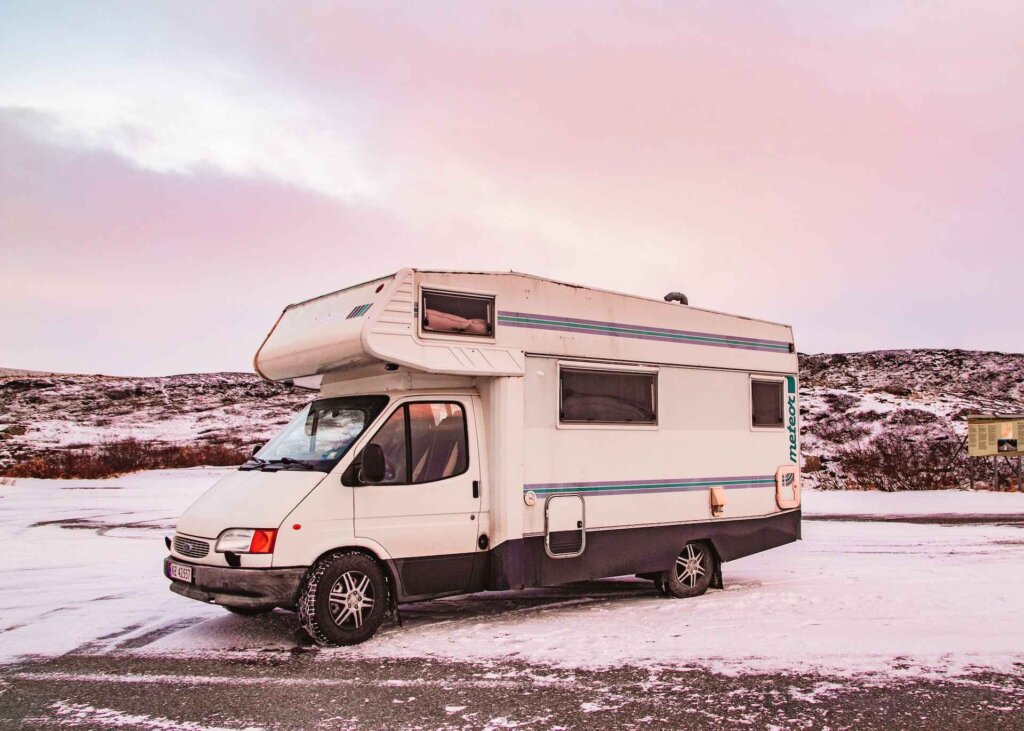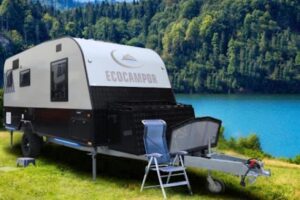And what do people seem to want? They want to travel. They want freedom. They want more control over how they spend each day, each month, each year. This realization of the desire for movement and freedom has inspired many Americans to drop everything, buy an RV, and hit the road.
Maybe you’ve been considering this move yourself!
Sounds nice to just pack up your bags and dip out, right? To cruise around in a camper enjoying Mother Nature’s bountiful vistas, exploring small towns across America, and making new friends.
But this lifestyle isn’t for everyone. In fact, many people who assume they are going to love the RVer way of life end up not enjoying themselves nearly as much as they thought they would.
So, before you go and put your house up for sale and dish out some serious dough for an RV, give this article a read through and find out if RV life is suited for you. These 16 pros and cons of living in an RV should help to shed some light on the true ins and outs of #RVlife.
8 Pros of Living in an RV
The perks of living in an RV are pretty sweet. For many people, even just a few of these 8 advantages are enough to convince them that they should be living in an RV.
1. Location independence
Maybe you’ve heard this term floated around a few times in recent years. Location independence refers to being free of obligations to any one specific place. It means you have no need to be physically present in a place for your life to proceed as normal.
Let me tell you from personal experience that location independence is pretty sweet. I am currently location independent and am using my lack of physical ties to pursue living abroad for the next several years. Despite holding an American passport, I am currently living in and working from Thailand while enjoying amazing food and plenty of sunshine.
Now, it’s important to note that not having a house or apartment is not the only requirement for a location independent lifestyle. Another big piece of that puzzle is income, but I’ll touch more on that later.
2. Money savings
Living in an RV can be quite inexpensive… depending upon how you do it. Without mortgage payments, rent, or the typically high utility cost of living in a traditional house, it’s very possible to save a lot of money on overall living expenses.
Assuming the RV is owned in full, RVers trade rent or mortgage payments for RV park fees, and instead of paying to heat and cool a large house, only have to maintain climate in a compact space. This can result in tremendous savings, especially in utilities.
Houses consume an absurd amount of resources. Between water, electricity, and natural gas, most folks dish out at least a couple hundred bucks towards utilities every month. Living in a small space like an RV can allow a person to only consume the resources they need, with minimal wastage.
If you are trying to save every penny possible, boondocking can cut your monthly expenses down even more.
3. Remote work
The second piece of the location independence puzzle I talked about earlier. Working remotely allows people to maintain a steady and reliable income while having the freedom to move about as much or as little as they please.

Apart from retirees, many people who live full time in an RV have to maintain some form of income. With a remote job, all a person needs to work is a computer and an internet connection. Whether you are high up in the Rocky Mountains of Colorado or sitting seaside in Oregon, you’ll be able to get your work done on your terms.
4. Time in nature
Over the past 100 years, widespread urbanization has drawn people into cities and metropolitan areas. It’s where the jobs are, where the people are, where the conveniences of modern life are.
But it’s also pulled people away from nature. Many working professionals and city dwellers report they do not spend nearly as much time outside in nature as they would like.
Full time RV living fosters an intimate relationship with nature that is difficult to achieve while living in a house. Most of the best RV parks are nestled in scenic natural locations, far outside of city centers. While living in these parks your morning walk might be along the banks of a roaring river, with your evening night-cap spent chatting under the boughs of soaring pines.
Step outside your front door and you are right there, in nature.
5. See more of the country
Despite being the fourth largest country in the world by land mass, a shocking number of Americans have never left their home state. And many of those that have crossed state lines have only gone several states away before returning home.
America is huge. Not only is it huge, but within the borders of this one country, we have access to almost every type of ecosystem on Earth. Mountains, lakes, rivers, deserts, tropical jungles, and temperate forests. From the icy north to the sunny south, we’ve got it all. And it’s all worth seeing!
Living in an RV full time is the easiest and cheapest way to casually roam every corner of this beautiful country.
6. Family bonding
If you live and travel with your family or a partner, living full time in an RV with them will allow for unique and precious bonding time. You’ll get to see each other in all of the high moments and all of the low moments. Daily chores and challenges will endear you to each other as you work together to live and thrive.

Many families that transition into full time RV living say that the experience ultimately resulted in a stronger family unit than they had before. In an age of fast living and numerous distractions, this type of familial closeness should be yearned for and treasured.
7. Travel with your pets
Under normal circumstances, traveling with a pet isn’t easy. Sometimes it isn’t even possible. Airlines make it difficult or extremely expensive to fly with an animal, and some cats and dogs do not do well in cars for extended periods of time.
RVs on the other hand, give furry friends a nice luxurious place to rest and relax while traveling. You can bring them along as you adventure around and trust that they have a space that they feel is safe and theirs.
Being in the mountains is sweet. Being in the mountains with a dog? Sweeter. Being in the mountains with an adventure cat? Absolutely epic.
8. Visit friends and family
If you live far from your family and friends, you understand the pain that distance can cause. As much as you may want to just drop everything and go to your loved ones, it’s oftentimes not possible. You’ve got rent and bills to pay, a house to look after, a job to go to.
But what if you could bring all of those things along? RVers have more than ample opportunity to travel the country and see those closest to them without neglecting their everyday responsibilities.
This is especially useful if you have friends all around the country. Over the past decade my social circle has spread out across 8 or 9 states. It makes visiting them all in a cheap and timely manner quite tricky.
My partner and I’s solution? Work remotely and sleep in our truck camper whenever we want to tour around and see them all. By living out of an RV, we can cruise around to each friend on our own schedule and not worry about a deadline.

Cons of Living in an RV
Living the RV life isn’t all sunshine and rainbows. Sometimes it kind of sucks.
But that’s life, right? There’s never good without a little bit of bad. Here are eight drawbacks to RV life that you should be aware of. In my opinion, none of these things are deal breakers, but they might be for you.
Give this list a thorough read and make sure you can put up with these situations before diving into the RV lifestyle.
1. Fewer amenities
This has got to be one of the biggest drawbacks to RV living.
To put it plain and simple, RVs do not have much. They don’t have much space and they don’t have many amenities. Sure, they may have a little of everything, but they don’t have a lot of anything.
When living in an RV, expect showers to be cramped and lounging areas to be limited. Meals are limited by the small appliances in the kitchen. Want a bath? Forget about it!
When you are boondocking, you’ll have even fewer options. You’ll find that it’s not really worth draining a quarter of your freshwater tank just to bathe. And is that microwave burrito really worth the draw on your battery bank? Nah.
2. Less storage
Motorhomes and travel trailers have limited options for storing personal items. Most large rigs offer several storage compartments that can be accessed from the outside of the camper, but many small rigs don’t even have those.
The lack of storage space does offer a beautiful opportunity to practice minimalism, but by and large, it’s frustrating. Many RVers have to become very effective packers and learn how to fully utilize every square inch of available space in storage compartments, closets, and cabinets.
3. Maintaining income

I feel like in many pros and cons lists, there’s an item that can be considered both an advantage and a drawback. In regard to full time RV life, that item is income.
On one hand, maintaining a remote job is the best way to achieve time, location, and lifestyle freedom. On the other hand, maintaining a remote job can be difficult if you move around frequently, as many RVers do.
You’ve got to make sure you always have access to fast, reliable internet- something that’s not always easy to do if you’re gallivanting around this country’s wild spaces.
It’s also quite easy to feel like life in an RV is life in perpetual vacation. It’s not. A negligent attitude towards work isn’t sustainable on the road.
4. Tight living quarters
Cramped living conditions can quickly become a deal breaker for people trying out RV life. Campers do not offer much in the way of personal space and depending upon how much alone time you and your family need, lack of privacy can build tension fast.
Three or four people living in a medium or large sized motorhome can be done if everyone gets along well. That same amount of people living in a small travel trailer would probably be difficult though.
Even two people living in a decently sized RV can be tough. Conflict is difficult to navigate when neither party has a comfortable place to go for solitude and reflection.
5. Maintenance
RVs are more vulnerable to the effects of weather and pests than traditional homes. They require regular maintenance to ensure that the mechanical and electrical components do not become damaged or fall into disrepair.
Depending upon where you are living at the time, damage to an RV can rapidly evolve into a major hassle. If the vehicle is not drivable, you may end up paying a premium to have your rig recovered by a tow truck.

One upside to maintenance on an RV is that campers aren’t nearly as large as houses. Any maintenance that is required typically doesn’t take too long because the projects are relatively small.
6. Dumping waste
Every RVers least favorite task.
Dumping waste is an unfortunate but necessary chore in RV life. Over time, the black tank in any RV is going to fill up and when it does, someone has to dump it. Luckily RV waste systems are designed in such a way that you don’t have to interact with the waste itself that much, but it’s still quite unpleasant.
In addition to dumping waste tanks, regular cleaning must be performed so waste doesn’t build up in the system and cause problems. An improperly maintained waste system can result in unhealthy living conditions and a hefty repair bill if professional repairs are needed.
7. Susceptible to climate
It is quite a bit harder to maintain a consistent climate in an RV than in houses. In a space as small as a camper, it takes very little to disrupt an achieved environment. Even something as minor as opening the front door to step outside can be enough to let out all of your warm cozy air and let in a blast of frigid winter air.
RVs rarely have insulation that can compete with that of a house. Because of this, hot summer air and cold winter air has a stronger effect on the internal temperature of an RV.
The appliances in an RV do their best to control the climate, but oftentimes do not have the strength to combat extreme temperatures.

8. Less privacy
For some unknown reason, campground neighbors have a tendency to be quite nosey. Maybe they’re bored, maybe they miss living in a proper suburb with neighbors they can spy on, or maybe it’s just interesting to always have new people rolling through.
Regardless, it’s not uncommon to settle into a new RV park campsite and notice your older retired RV neighbors seemingly really interested in your comings and goings.
Personally, this type of invasion of privacy drives me crazy. For some it might not be a big deal. The best way to avoid these situations is to simply drive deep into the backwoods, far, far, away from other people and boondock. That’s a happy place.
Frequently Asked Questions
Will I save money living in my RV?
It’s not guaranteed that anyone will save money by moving from a house into an RV. It’s largely dependent on lifestyle, cost of living, and income. But there is real potential to save money if you can embrace minimalism and simple living.
What is the best RV to live out of?
For a single person living in an RV, I suggest looking into purchasing a small to medium sized travel trailer with enough headroom to stand fully upright. For 2+ people, a large travel trailer or motorhome offers the best living conditions.
Is owning an RV cheaper than a house?
while owning an RV can be cheaper upfront than owning a house, it is important to consider the upfront cost,maintenance and repair costs,operating costs,depreciation and lifestyle factors when making a decision. For those who value mobility and travel, an RV may be a better fit, while those who prioritize stability and long-term investment may prefer owning a house.
Not everyone wants to live in an RV. Some people just know that it’s not the lifestyle they desire.
But if you’ve ever wondered if a simple life on the road is for you, don’t be afraid to make that leap. You never know where you might end up.
Happy camping!



